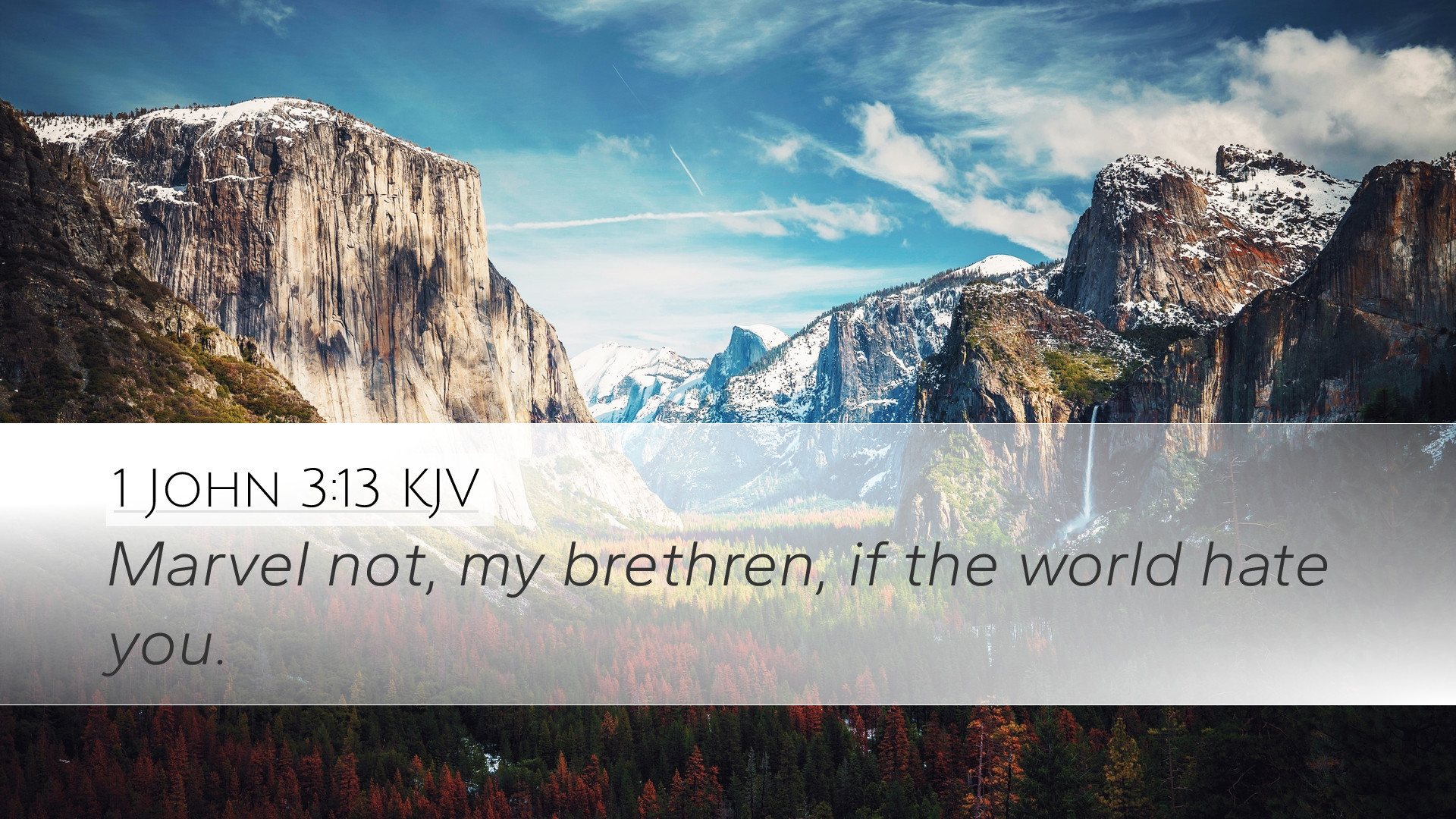Old Testament
Genesis Exodus Leviticus Numbers Deuteronomy Joshua Judges Ruth 1 Samuel 2 Samuel 1 Kings 2 Kings 1 Chronicles 2 Chronicles Ezra Nehemiah Esther Job Psalms Proverbs Ecclesiastes Song of Solomon Isaiah Jeremiah Lamentations Ezekiel Daniel Hosea Joel Amos Obadiah Jonah Micah Nahum Habakkuk Zephaniah Haggai Zechariah Malachi1 John 3:13
1 John 3:13 KJV
Marvel not, my brethren, if the world hate you.
1 John 3:13 Bible Commentary
Commentary on 1 John 3:13
Bible Verse: “Do not be surprised, brothers, that the world hates you.” – 1 John 3:13
Introduction
In this poignant verse from John's first epistle, we encounter a vital reminder about the Christian experience in relation to the world. John, the beloved disciple, speaks to the early church in a context rife with persecution and misunderstandings arising from their faith in Christ. This commentary seeks to unpack the theological significance of this verse, drawing insights from classic public domain commentaries by Matthew Henry, Albert Barnes, and Adam Clarke.
Contextual Analysis
Before delving into the verse itself, it is essential to set the context within which John writes. The early believers faced hostility from the surrounding world, a world that largely rejected the message of Christ. Understanding this backdrop allows for a more profound appreciation of John's exhortation.
The Nature of the World’s Hatred
John’s admonition to not be surprised by the world’s hatred ties closely with the teachings of Jesus Himself. In the Gospels, Jesus warned His disciples that they would share in His sufferings (John 15:18-20). Albert Barnes notes that the tendency of the world to oppose true Christianity arises from the inherent enmity between the nature of sin and the righteousness of God.
Henry elaborates on this point, stating that the world's hatred does not merely stem from personal animosities but reflects a deeper spiritual conflict. The “world” represents a system opposed to God, demonstrating hostility toward those who embody His truth and righteousness.
Reasons for the Hatred
- Different Natures: The fundamental difference between the nature of believers and the nature of the world leads to inevitable conflict, as outlined by Clarke. Believers are born of God and are called to a life of holiness, which contrasts sharply with the world’s sinful values.
- Light vs. Darkness: John uses the metaphor of light and darkness extensively in his writings. Barnes highlights that the light of Christ reveals sin and evil, provoking animosity from those who prefer darkness.
- Rejection of Sin: By refusing to engage in worldly behaviors, believers provoke resentment. As Henry emphasizes, holiness is often a source of conviction for those entrenched in sin, leading to hostility rather than acceptance.
Pastoral and Theological Implications
This passage holds significant implications for pastors, students, theologians, and Bible scholars. First, it serves as an encouragement to endure persecution and hostility. John reassures the believers that such experiences are to be expected and not considered an anomaly.
Moreover, understanding the nature of opposition from the world equips believers to respond in grace and truth. Rather than succumbing to despair in the face of hatred, they are called to remain steadfast in love, grounded in their identity as children of God.
Conclusion
In 1 John 3:13, the apostle articulates a timeless truth for Christians throughout history: the world may indeed hate them, but they are called to transcend this hatred with a love that reflects Christ’s own. This verse does not only serve as a grim reminder of the realities of the Christian walk but as an invitation to deeper communion with God, who sustains His people amidst trials.
As we reflect on this passage and its commentary, let us find strength in the assurance that God transcends the world's enmity, calling us to live out our faith boldly and lovingly, grounded in the truth of our identity in Christ.


